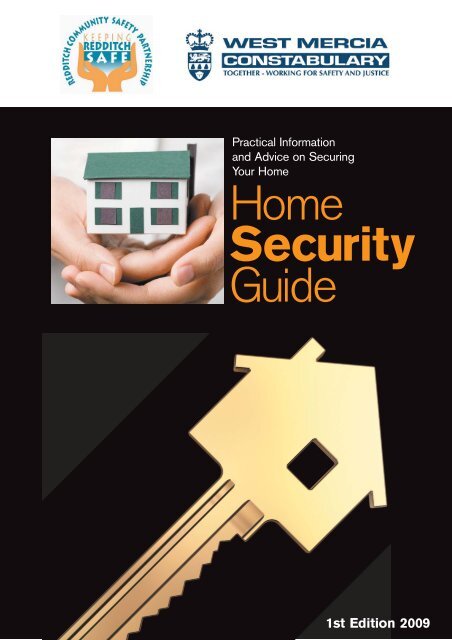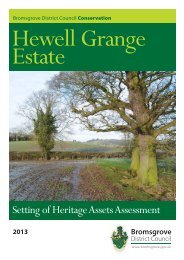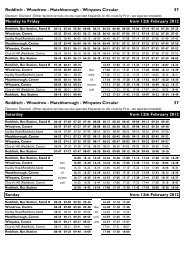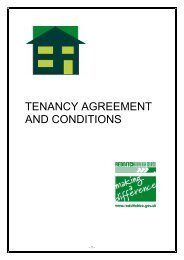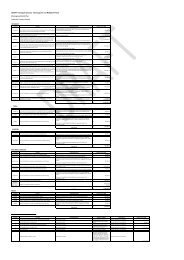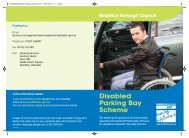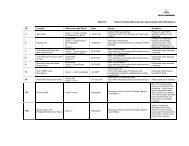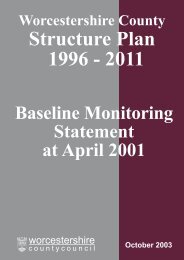Home Security Guide - Redditch Borough Council
Home Security Guide - Redditch Borough Council
Home Security Guide - Redditch Borough Council
Create successful ePaper yourself
Turn your PDF publications into a flip-book with our unique Google optimized e-Paper software.
Practical Information<br />
and Advice on Securing<br />
Your <strong>Home</strong><br />
<strong>Home</strong><br />
<strong>Security</strong><br />
<strong>Guide</strong><br />
1st Edition 2009
Dear Resident<br />
This guide has been produced by the <strong>Redditch</strong> Community Safety Partnership to provide you with<br />
practical information and advice on how to improve the security of your home. Many security<br />
improvements are surprisingly straightforward and easy to complete for those who enjoy DIY.<br />
If you require a professional security firm to work on your home, we have provided you with advice on<br />
how to locate an appropriately qualified company.<br />
If you would like to discuss any of the issues contained within this guide, please contact <strong>Redditch</strong><br />
<strong>Borough</strong> <strong>Council</strong>’s Community Safety Team on 01527 534187.<br />
Yours faithfully,<br />
Sue Hanley, Chair of the <strong>Redditch</strong> Community Safety Partnership.<br />
How to use this guide<br />
This guide provides you with structured advice and support to improve the security of your home. To get the<br />
most from the guide we recommend that you read the information in order.<br />
Once you are familiar with the contents detach the enclosed <strong>Home</strong> <strong>Security</strong> Checklist. It will provide you with<br />
a step-by-step guide to assessing your home security and making the necessary improvements to secure your<br />
home.<br />
Keeping your home safe<br />
Most burglaries are committed by an opportunist. This is someone who takes advantage of an opportunity to<br />
commit a crime with little or no pre-planning.<br />
Criminals often choose a home where they can approach and escape unnoticed, that looks unoccupied and<br />
has poor security. A burglar is more likely to target a home that they can enter quickly with little risk of being<br />
noticed.<br />
Up to half of burglars gain entry without force - through an open door or window. Simply fitting strong locks<br />
to your doors and windows, and always keeping them locked, will significantly reduce your risk of being burgled.<br />
Notes for tenants: Whilst most landlords are willing to help their tenants secure their properties, there is no<br />
legal obligation for them to undertake the specific works detailed in the guide. Any alterations to the property,<br />
undertaken by the tenant will need to be done with the permission of the landlord.<br />
<strong>Home</strong><strong>Security</strong><strong>Guide</strong> 03
<strong>Home</strong><strong>Security</strong><strong>Guide</strong><br />
Contents<br />
Page<br />
03 How to use this guide<br />
03 Keeping your home safe<br />
06 External doors<br />
10 Windows<br />
12 Gates and fences<br />
13 Sheds<br />
13 Garages<br />
13 <strong>Security</strong> lighting<br />
14 General outdoor security<br />
14 <strong>Security</strong> alarms<br />
17 When your house is empty<br />
17 Property marking<br />
18 Insurance<br />
18 If your home is burgled<br />
18 Selecting a security company<br />
19 Bogus callers and rogue traders<br />
19 Nominated Neighbours Scheme<br />
21 Useful contacts<br />
22 Property record sheet<br />
23 <strong>Home</strong> security checklist<br />
Look at your home from a criminal’s perspective.<br />
Could you get in without your keys?<br />
Could you break in without being noticed?<br />
04 <strong>Home</strong><strong>Security</strong><strong>Guide</strong>
Doors<br />
Two out of every three burglars will<br />
enter a home through a door. Always<br />
ensure that external doors are locked.<br />
<strong>Home</strong><strong>Security</strong><strong>Guide</strong> 05
<strong>Home</strong><strong>Security</strong><strong>Guide</strong><br />
External Doors<br />
Always ensure that external doors leading into<br />
unoccupied rooms are locked. If you are thinking of<br />
replacing a door, we strongly recommend choosing<br />
one that is kite-marked to British Standard PAS-24-<br />
1 ‘Doors for Enhanced <strong>Security</strong>’. Regardless of any<br />
other claims, which are commonly made by suppliers,<br />
only this type of door will have been tested for<br />
security. Insist that your supplier provides a door<br />
which meets this standard.<br />
Door & Frame<br />
Both the door and frame should be solid, strong and<br />
free from cracks and warping. Wooden doors should<br />
be at least 44mm, (1 3 /4 inches), thick.<br />
Doors and frames are weaker where locks, keeps<br />
and hinges are fitted. Reinforcing these areas with<br />
steel strips or plates, often referred to as hinge or<br />
frame guards, will improve the strength of your door<br />
set.<br />
Many lower door panels are thin and not as strong<br />
as the main sections of the door. These are<br />
vulnerable to being kicked through. Consider<br />
reinforcing this type of panel with a stronger,<br />
surface-mounted panel, or consider other ways to<br />
make it stronger, such as fitting internal door bars.<br />
Try and avoid buying doors which have thin panel<br />
sections that could be easily kicked in.<br />
Hinges<br />
Hinges should be sturdy, free from rust and secured<br />
with long screws. The hinge side of a door can be<br />
made more secure by fitting hinge bolts. When the<br />
door is closed these lock the door into the frame.<br />
Hinge bolts are especially important for outwardopening<br />
doors.<br />
Door Chain/Door Defender<br />
A door chain or door defender provides security<br />
when opening the door to a caller. You should always<br />
use the chain or bar when answering the door to<br />
someone you do not know.<br />
Door Defender<br />
Door Viewer<br />
A door viewer helps you identify callers without<br />
unlocking the door. It is always important to know<br />
who is at the door BEFORE you open it. Fit an<br />
outside light next to the door so you can see outside<br />
when it is dark.<br />
Where a door viewer cannot be fitted an alternative<br />
solution would be to install a small CCTV camera<br />
which relays images of a caller to your TV or handset<br />
screen.<br />
Glass panels in or next to your door make it<br />
particularly vulnerable, especially if a panel, once<br />
broken, would allow access to your locks. Get a<br />
professional installer to replace normal glass with<br />
laminated glass, which is much stronger and safer.<br />
Letterbox<br />
Letterboxes should be at least 400mm, (16 inches)<br />
away from any locks. A letterbox deflector allows<br />
mail to be delivered but prevents a thief from being<br />
able to reach in with their hand.<br />
Front Wooden Door<br />
Door keys, car keys, wallets and<br />
money should not be within sight of<br />
letterboxes, glazing or cat flaps.<br />
06 <strong>Home</strong><strong>Security</strong><strong>Guide</strong>
Wooden Door Locks<br />
Mortice Deadlock<br />
A five-lever mortice deadlock, certified as indicated<br />
by the kite mark to British Standard BS3621<br />
(BS8621 for flats), is a strong lock fitted to the lower<br />
half of the door. It provides a good level of protection<br />
against most forms of attack.<br />
Mortice Deadlock<br />
Rim Lock (night-latch)<br />
If you have a wooden front door, with only one<br />
locking point, a night-latch can be added. A nightlatch<br />
automatically locks when the door is closed. It<br />
is opened from the inside using a lever, but from<br />
outside requires a key. When buying a night-latch<br />
look for one kite-marked to British Standard<br />
BS3621.<br />
Automatic Deadlock<br />
This type of lock can be secured requiring a key to<br />
open it from both the inside and outside, and is<br />
therefore more secure than a night-latch.<br />
UPVC Door Locks<br />
Most UPVC doors have a multi-point locking system<br />
with at least three bolts operated by the turn of a<br />
handle, thumb-turn or key. Claw/hook bolts, which<br />
lock the door into the frame, provide greater security<br />
than shoot bolts.<br />
Many burglaries take place when residents forget to<br />
lock their doors. Standard UPVC door locks can be<br />
replaced with ones with a night-latch facility. This<br />
means they lock automatically when the door is<br />
closed.<br />
The cylinder locks on UPVC doors may be<br />
vulnerable to a method of entry known as key<br />
bumping. It is a method by which a burglar will open<br />
the lock using an adapted key. If you replace the<br />
cylinder with a one kite-marked to BS3621:2007,<br />
(or later), it will be resistant to this form of entry.<br />
If you are adding any security feature, a door chain,<br />
door viewer etc, to a UPVC door be aware that you<br />
could damage the locking mechanism, or affect your<br />
warranty. Seek advice from the manufacturer before<br />
adding additional security features to this type of<br />
door.<br />
Back Doors<br />
A wooden back door can be secured with the<br />
addition of mortice bolts, also known as rack bolts, to<br />
the top and bottom of the door.<br />
Mortice<br />
Deadbolt<br />
Mortice<br />
Deadlock<br />
Automatic Deadlock<br />
Mortice<br />
Deadbolt<br />
Back Wooden Door<br />
<strong>Home</strong><strong>Security</strong><strong>Guide</strong> 07
<strong>Home</strong><strong>Security</strong><strong>Guide</strong><br />
Mortice Deadbolts need to be locked from the inside<br />
and therefore require you to use the front door to<br />
exit the house.<br />
Patio Doors<br />
Sliding patio doors should have more than one<br />
locking point. Many modern doors are fitted with a<br />
multi-point locking system. If your doors do not have<br />
this type of system, additional patio door locks<br />
should be fitted to the top and bottom of the sliding<br />
door. Anti-lift devices can also be fitted to sliding<br />
patio doors to prevent burglars lifting them off their<br />
guiding rail.<br />
French Windows<br />
Mortice Deadbolt,<br />
shown with Key<br />
and Thumbturn<br />
Normally French windows are double doors that<br />
open outwards. They should be fitted with at least<br />
two locking points securing both doors together and<br />
each door should have two mortice bolts securing<br />
them to the frame top and bottom, see diagram<br />
below.<br />
The hinges on French windows are typically located<br />
on the outside of the door. A burglar may break the<br />
hinges and pull a door away from the frame. Fitting<br />
hinge bolts, one per hinge, would secure the door in<br />
its frame even if the hinges were attacked.<br />
Keys<br />
Do not leave keys in their locks or your car keys on<br />
display. If a criminal can see your keys from outside,<br />
they may be prepared to take greater risks to get to<br />
them.<br />
Do not hide a spare key outside your home. If<br />
necessary leave it with a trusted neighbour.<br />
Do keep your door keys out of sight but near the<br />
door. In the event of an emergency you may need to<br />
exit quickly.<br />
Do plan an easy escape route and make sure<br />
everyone in the house knows the plan.<br />
Flats<br />
1. The Private Door<br />
The front doors to homes off communal areas<br />
should be no less secure than those in a traditional<br />
house. For door security you should follow the<br />
guidance above. However, locking mechanisms<br />
should be fitted in accordance with British Standard<br />
BS5588 ‘Part 1, 1990 Fire Precautions in the<br />
Design and Construction and Use of Buildings’.<br />
You should be able to open the lock from the inside<br />
by a single manual operation without a key. The best<br />
way of achieving this is to ensure the door is fitted<br />
with a multi-point locking system with an internal<br />
thumb-turn kite-marked to British Standard 8621:<br />
2007 or later.<br />
2. Communal Doors<br />
The security of communal entrance doors can be<br />
enhanced with a phone entry system, or preferably<br />
a video entry system, so that occupants can see<br />
callers before allowing them in.<br />
Treat these doors as a first line of defence. Never<br />
let anyone in you do not know, unless you are<br />
absolutely sure they are genuine. Also, make sure<br />
the door closes behind you and locks shut. Never<br />
allow anyone to follow you in, unless you are sure<br />
they have a right to be there.<br />
Never hide a spare key outside your<br />
home. Burglars will often check for<br />
keys hidden inside a letterbox, under<br />
a mat or garden ornament or inside<br />
guttering etc.<br />
08 <strong>Home</strong><strong>Security</strong><strong>Guide</strong>
Windows<br />
One in three burglars will enter a<br />
property through a window.<br />
<strong>Home</strong><strong>Security</strong><strong>Guide</strong> 09
<strong>Home</strong><strong>Security</strong><strong>Guide</strong><br />
Windows<br />
When replacing windows choose those certified to<br />
British Standard BS7950: ‘Windows for Enhanced<br />
<strong>Security</strong>’. Unless a window is to be used as a fire<br />
exit, make sure it is fitted with a key-operated<br />
window lock.<br />
When replacing a window consider one with a small<br />
opening, rather than one an intruder could climb<br />
through. Consider a design similar to that below to<br />
make it harder for an intruder to enter.<br />
Only a small part of this window can be opened for ventilation, making it<br />
difficult for an intruder to enter.<br />
More secure window locks require a specific key to<br />
open them. A burglar will be reluctant to risk the<br />
noise of breaking glass, especially if the window is<br />
locked shut and the key removed.<br />
Seek professional advice before fitting locks to<br />
UPVC or metal windows as this may affect your<br />
warranty. It is best to get a member of the Master<br />
Locksmiths Association to fit locks for these types of<br />
windows, see page 21 for contact details.<br />
Laminated glass contains a clear plastic layer. It can<br />
be used to improve window security as it is far more<br />
difficult to break than other types of glass. Generally<br />
the thicker the laminated glass used, the stronger it<br />
will be. Laminated glass looks almost identical to<br />
ordinary glass and is easy to purchase. Decorative<br />
metal security grills can help to protect windows,<br />
however these should not be used on windows<br />
requiredº as fire exits. <strong>Security</strong> film can be used as an<br />
alternative, but to be fully effective it should be fitted<br />
across the entire pane of glass anchored to the<br />
frame or fitted beneath the glazing beads.<br />
Ground floor windows and those accessible by<br />
climbing onto a flat roof are most vulnerable,<br />
especially if they are not overlooked. Where possible<br />
consider planting thorny shrubs against the wall<br />
beneath ground floor windows. If an intruder cannot<br />
reach a window they will be unable to climb in.<br />
Remember to secure garage windows, especially if<br />
there is an internal door connecting the garage to<br />
the main house.<br />
Do not leave windows open in an unoccupied room.<br />
Do fit window locks and use them. Keep your<br />
window keys out of sight.<br />
Sash Window Bolt<br />
Louvre windows - windows made from several<br />
horizontal slats - are particularly vulnerable. The slats<br />
can be removed without great force. If you are<br />
unable to replace louvre windows with fixed glass,<br />
seek advice on bonding the slats into their fixtures or<br />
installing a specialised louvre window lock.<br />
Automatic Window Lock<br />
Any window that opens wider than<br />
the human head can be<br />
an entry point.<br />
10 <strong>Home</strong><strong>Security</strong><strong>Guide</strong>
Outside<br />
Burglars will often target homes that<br />
appear poorly maintained, with<br />
untidy gardens, thinking they would have<br />
poor security.<br />
<strong>Home</strong><strong>Security</strong><strong>Guide</strong> 11
<strong>Home</strong><strong>Security</strong><strong>Guide</strong><br />
Gates and Fences<br />
A fence around the perimeter of your house will slow<br />
down a burglar both entering and leaving your home.<br />
This increases their chances of being seen and<br />
caught.<br />
To the Front<br />
Planting, walls and fencing towards the front of your<br />
house should be low enough to ensure that an<br />
intruder would be seen by passers byº. High barriers<br />
such as tall fences and hedges allow a burglar to<br />
work unnoticed, making your home a more attractive<br />
target.<br />
Low fences, hedges or walls at the front of your<br />
home may not seem like much of a barrier, but they<br />
provide a clear definition between your property and<br />
public space. They provide a strong psychological<br />
deterrent, as crossing this boundary will make an<br />
intruder feel more conspicuous.<br />
To the Rear<br />
A strong, tall fence, at least 1.8 metres in height,<br />
with secure gates can prevent access to the rear of<br />
your home. Check your fences for loose or broken<br />
panels. Some people prefer thorny hedges as a<br />
means to secure their boundary. Make sure that<br />
such hedges are well-maintained and free from<br />
gaps.<br />
Gates<br />
Many gates are only locked by a sliding bolt. While<br />
this may make it more difficult for intruders to enter<br />
your garden, it provides a burglar with an easy escape<br />
route. A gate lock requiring a specific key will provide<br />
better security. Your gate should be at least 1.8<br />
metres (6 feet) high.<br />
Gates can be fitted to the side of a house to stop an<br />
intruder walking around the back. Side gates should<br />
be fitted flush to the front of the building so that<br />
anyone trying to climb them would be more likely to<br />
be noticed. A dusk-to-dawn security light above the<br />
gate will help make an intruder visible and<br />
conspicuous during the hours of darkness.<br />
Stopping Climbers<br />
Fixed fences or walls taller than 2 metres (6 feet, 6<br />
inches) will almost certainly require planning<br />
permission. If the fence or wall is next to a road it<br />
cannot be higher than 1 metre ( 3 feet, 3 inches)<br />
without planning permission. If in doubt check with<br />
your local Planning Department.<br />
Make sure there are no potential climbing aids close<br />
to fences or gates such as low walls with large<br />
garden ornaments or wheelie bins. Where possible<br />
secure your wheelie bin in an inaccessible location<br />
such as a bin store garage or shed. If this isn’t<br />
possible secure your wheelie bin to a wall bracket<br />
using a chain and padlock. Remember to unlock it<br />
prior to a bin collection.<br />
Where you cannot remove a climbing aid, you should<br />
consider additional anti-climb measures such as<br />
adding lightweight trellis or planting thorny shrubs.<br />
Lightweight trellis will not support a person’s<br />
bodyweight making it more difficult to climb.<br />
Anti-climb paint is not recommended as it is<br />
relatively easy to climb over, requires routine<br />
repainting and looks unsightly.<br />
Planting a thorny hedge between your fence and the<br />
public space can help to protect your fence and<br />
home. However, make sure you are not planting on<br />
land you do not own without permission.<br />
Railing style gates reduce the chance of a burglar working<br />
on a property unnoticed.<br />
Do not use potentially harmful<br />
anti-climb measures on walls and fences,<br />
such as nails, broken glass or barbed wire.<br />
If they cause an injury you may be held<br />
legally responsible.<br />
12 <strong>Home</strong><strong>Security</strong><strong>Guide</strong>
Sheds<br />
Sheds are not designed for secure storage. They are<br />
generally constructed from low-quality timber and are<br />
popular targets for burglars.<br />
Many burglars will use tools from a shed to break<br />
into the house. Ideally sheds should not be used to<br />
store expensive items such as power tools, mowers,<br />
or bicycles. However, if you have no alternative you<br />
should consider the following security measures:<br />
- Ensure that your shed has strong locks. If your<br />
shed timber is less than 44mm thick, fit a rim lock<br />
rather than a mortice lock. If a lock is fixed into<br />
the shed timber with screws it can be levered<br />
away. In place of screws use mushroom-headed<br />
bolts, (coach bolts), reinforced inside the shed with<br />
a steel plate or wide metal washer<br />
- Padlocks are generally not recommended, although<br />
if you do use one, ensure it is good quality and has<br />
a closed shackle made from hardened steel. A<br />
closed shackle padlock is less likely to be cut with<br />
bolt cutters.<br />
Closed shackle padlock<br />
Open shackle padlock<br />
- Shed windows are generally flimsy and very<br />
vulnerable. When buying a shed, consider choosing<br />
one without windows. If your shed does have<br />
windows, consider screwing them down so that<br />
they are closed permanently, and fix grilles or bars<br />
over them to make them more secure<br />
- Fit a ground anchor set into a concrete base. Chain<br />
items such as mowers and bicycles together<br />
- Permanently mark property stored in your shed<br />
with your house number and post code. Display a<br />
notice warning criminals that your property has<br />
been security marked. For advice about purchasing<br />
a property marking kit and stickers contact your<br />
local police team<br />
- As an extra deterrent, consider fitting a battery<br />
operated alarm or upgrading the house alarm<br />
to include the shed. Advertise any security<br />
measures by displaying warning signs.<br />
Garages<br />
If possible keep your car locked in a garage rather<br />
than on the drive. Many garages have a single metal<br />
door which opens in an ‘up and over’ movement<br />
bringing the door horizontal with the roof. The fitted<br />
locks on these doors provide little security. It is<br />
therfore a good idea to fit additional garage door<br />
bolts, or a garage door defender.<br />
If there is a connecting door from the garage into<br />
the house this should be the same quality, and have<br />
the same level of security, as a rear door. It should<br />
also be fire rated to at least thirty minutes. This<br />
means it will withstand fire for thirty minutes.<br />
If your home is fitted with an intruder alarm system<br />
consider extending it to cover the garage.<br />
<strong>Security</strong> Lighting<br />
Burglars operating during the hours of darkness<br />
are less likely to be seen. Lighting areas where a<br />
burglar could enter your garden or access a door,<br />
window or climbing aid, such as a drainpipe, removes<br />
this advantage.<br />
Dusk-to-dawn lights are fitted with a light sensor and<br />
so turn on during darkness. Fit high-efficiency, lowenergy<br />
bulbs to provide an appropriate level of light<br />
at the smallest cost. Motion sensor lights do not<br />
provide the same level of deterrent. However dual<br />
sensor lights can be purchased which provide<br />
medium dusk-to-dawn lighting and will switch to full<br />
power when movement is detected.<br />
Dusk to Dawn Lampholder<br />
<strong>Home</strong><strong>Security</strong><strong>Guide</strong> 13
<strong>Home</strong><strong>Security</strong><strong>Guide</strong><br />
<strong>Security</strong> lighting should be fitted where possible 2.5<br />
metres (8 feet) above ground level. This will reduce<br />
the risk of the lights being tampered with. Lights<br />
should be positioned to avoid annoying the<br />
neighbours and pedestrians or distracting traffic.<br />
The Garden<br />
A burglar is more likely to target a home which looks<br />
uncared for. Keeping your doors and windows clean,<br />
repainting the frames and keeping your gardens<br />
well-maintained will reduce the likelihood of a<br />
burglary.<br />
Adding certain types of gravel, for example York<br />
Gold, to paths and driveways will deter burglars as it<br />
can be noisy to walk on.<br />
Remember most burglaries happen when someone<br />
spots an opportunity to enter a property. Remove or<br />
secure any of the following in your garden:<br />
- Ladders and climbing aids. If you are unable to<br />
store a ladder in a garage or shed, lock it<br />
horizontally to a secure wall bracket. A wheelie bin<br />
placed below a low roof or fence provides an ideal<br />
climbing aid. If you are planning to build a gazebo<br />
onto your house ensure it does not help a burglar<br />
access the vulnerable upstairs windows<br />
- Gardening tools. The unequipped burglar can<br />
make good use of any tools you provide for them.<br />
Items such as spades, forks and screwdrivers can<br />
aid a burglar<br />
- Bricks and masonry. A burglar may use loose<br />
bricks or masonry to break a lock or window<br />
- Confidential waste. If you have a recycling bin, do<br />
not place unshredded personal documents inside.<br />
These may be used to aid identity theft<br />
A garden fork, or spade, left outside<br />
can be used to force open a door or<br />
window.<br />
An anchor point, chain and padlock, fitted to an outside wall, can be used to<br />
secure an item which cannot be stored in a shed or garage.<br />
<strong>Security</strong> Alarms<br />
A visible alarm is a powerful burglary deterrent.<br />
Expensive, sophisticated systems need to be<br />
installed by professionals. Cheaper DIY versions<br />
are less reliable and can cause a nuisance through<br />
false alarms.<br />
Before purchasing an alarm system talk with your<br />
insurance company. They may offer you a discount<br />
on your annual premium if it meets their required<br />
standard.<br />
<strong>Security</strong> alarms provide a useful warning and limit<br />
the risk of theft and damage to your home. Surveys<br />
have consistently shown that houses are much less<br />
likely to be burgled if an alarm is fitted.<br />
An experienced burglar can tell if an alarm box is a<br />
dummy. The cost of professionally installing a good<br />
quality alarm system has fallen significantly over<br />
recent years.<br />
The effectiveness of an alarm system is not<br />
necessarily its ability to attract the attention of<br />
neighbours or passers-by, but the way it affects the<br />
burglar. Burglars do not like attracting attention to<br />
themselves and they will feel anxious and exposed<br />
when an alarm sounds.<br />
Alarm systems using motion sensors may be<br />
activated by pets. However there are pet friendly<br />
infra-red detectors available. This is something you<br />
should discuss with your installer.<br />
14 <strong>Home</strong><strong>Security</strong><strong>Guide</strong>
Monitored Systems<br />
Monitored systems send a signal to a central<br />
monitoring station which can quickly notify the police.<br />
Some systems allow the monitoring station to see if<br />
a burglar is in your home. These systems are more<br />
affordable now, although an annual maintenance<br />
and monitoring fee is required. This type of system<br />
should be kite-marked to British Standard BS4737<br />
(EN50131-1).<br />
Audible-only Systems<br />
An audible-only system will sound a bell or siren<br />
to attract attention and help to deter a potential<br />
burglar. This system should be kite-marked to<br />
British Standard BS4737 (EN50131-1) or<br />
BS6799 for a wire-free system. This type of system<br />
does not guarantee a police response.<br />
The police usually attend the activation of an<br />
audible-only alarm if there are suspicious<br />
circumstances reported to them, e.g. the sound of<br />
breaking glass.<br />
DIY Systems<br />
DIY alarm systems are available through a number<br />
of hardware stores. You should only attempt an<br />
installation if you are competent at DIY.<br />
This type of system should be kite-marked to<br />
British Standard BS6707.<br />
Professionally Installed Systems<br />
You should obtain quotes from at least three security<br />
companies who are subject to independent<br />
inspection by a recognised body such as:<br />
•NSI (National <strong>Security</strong> Inspectorate) formerly<br />
known as NACOSS, Sentinel House, 5 Reform<br />
Road, Maidenhead, Berkshire, SL6 8BY.<br />
Tel: 01628 637512. Web: www.nsi.org.uk<br />
•SSAIB (<strong>Security</strong> Systems and Alarms Inspection<br />
Board) 131 Bedford Street, North Shields, Tyne<br />
and Wear, NE29 6LA. Tel: 0191 2963242. Web:<br />
www.ssaib.org<br />
- Before you disclose any personal details, ensure<br />
that you have checked the credentials of your<br />
chosen company and requested proof of identity<br />
from their inspectorate, see above.<br />
Questions for your Alarm Installer<br />
- Ask which independent inspectorate the company<br />
is subject to, e.g. NSI, SSAIB and check the alarm<br />
system meets the required British Standard<br />
(see above)<br />
- Do you want to own or rent the system? Ask if<br />
there are any maintenance/monitoring contracts,<br />
or additional hidden extras such as<br />
call out charges<br />
- Ask how long the guarantee lasts for, and what<br />
happens if there is a problem after that? Is there a<br />
24-hour callout service and emergency<br />
attendance within four hours<br />
- Ask the installers for training on how you operate<br />
the system<br />
- Do not accept verbal contracts. Ensure that any<br />
agreements between you and the company are<br />
written, and that you or your representative read<br />
the contents carefully before signing.<br />
An alarm box is a powerful deterrent to burglary however professional burglars<br />
can tell the difference between a genuine and a dummy alarm system.<br />
Never buy a security system from<br />
a cold caller regardless of the<br />
claims they make.<br />
<strong>Home</strong><strong>Security</strong><strong>Guide</strong> 15
<strong>Home</strong><strong>Security</strong><strong>Guide</strong><br />
Inside<br />
An intruder will not want to be interrupted<br />
during a burglary. Almost half of burglaries<br />
occur when a property is empty.<br />
16 <strong>Home</strong><strong>Security</strong><strong>Guide</strong>
When Your <strong>Home</strong> is Empty<br />
Because most burglaries happen when a home is<br />
empty avoid discussing holiday plans in public.<br />
A burglar may look for several signs that a home is<br />
empty:<br />
- Curtains. If you have a trusted neighbour you<br />
could ask them to look after your home while you<br />
are away; for example drawing curtains and<br />
collecting mail<br />
- Lights and sound. Timer switches fitted to plugs<br />
can activate lights, radios etc at specific times.<br />
Ensure sound equipment is set to a volume that<br />
will not disturb neighbours<br />
- Milk, mail and newspapers. Cancel orders while<br />
you are away. The Royal Mail's 'Keepsafe' service<br />
can hold your mail for up to two months<br />
- Uncut grass. If you plan to be away from your<br />
home for a while mow the lawn before you leave.<br />
Consider storing valuable items from your shed in<br />
the house. You may want to leave important<br />
documents, jewellery and other high value items with<br />
a family member.<br />
When travelling, do not have your home<br />
address on luggage labels. This will<br />
advertise the fact that your home may be<br />
empty.<br />
Property Marking<br />
Every year the police recover hundreds of thousands<br />
of pounds worth of stolen property. However if they<br />
cannot identify the rightful owners it may be<br />
impossible to prove this property was stolen, or<br />
return it to its rightful owner.<br />
simple way of uniquely identifying property. If you<br />
want the mark to be out of sight do not choose a<br />
place so well hidden that the police would not be<br />
able to find it. Use the Property Record Sheet, see<br />
page 22, to record the details of your marked<br />
belongings.<br />
Consider the best method of marking your property.<br />
Marking items like jewellery or antiques may reduce<br />
their value. Get expert advice before you mark<br />
valuable items. In addition it is a good idea to<br />
photograph valuable items next to a ruler showing<br />
any distinguishing marks. This creates a simple and<br />
effective record of your valuables.<br />
Visible Marking<br />
This form of marking leaves a permanent, visible<br />
mark. Methods include using permanent marker pens<br />
and engraving. A visible mark is the best method of<br />
deterring a theft because anyone who comes into<br />
contact with the item can immediately see the<br />
identity of the rightful owner.<br />
Ultra-violet Marking<br />
This form of marking, using ultra-violet (UV) ink,<br />
leaves no visible mark and has the advantage of not<br />
‘defacing’ the item. The mark will only show up under<br />
a UV lamp. UV marks can fade over time, especially<br />
in sunlight, so they need to be occasionally renewed.<br />
Electronic Marking<br />
Certain electrical items such as TVs allow you to<br />
record your details into a password-protected menu<br />
screen.<br />
Smartwater<br />
Most areas of the UK support the use of a specialist<br />
property-marking tool called Smartwater. This is a<br />
clear liquid which has a unique forensic code. When<br />
Thieves find it difficult to sell identifiable<br />
property. Mark your valuable items and<br />
display ‘Property Marked’ window and<br />
door stickers.<br />
Your postcode followed by the number of your home,<br />
or the first two letters of your house name, is a<br />
Smartwater with UV Torch and Window Sticker<br />
<strong>Home</strong><strong>Security</strong><strong>Guide</strong> 17
<strong>Home</strong><strong>Security</strong><strong>Guide</strong><br />
the liquid is purchased the code is registered to the<br />
customer’s address.<br />
Police actively search for Smartwater, which shows<br />
up under certain types of UV light. It provides a<br />
permanent and irrefutable link between property and<br />
its owner. Contact your local police for more<br />
information about acquiring Smartwater kits, see<br />
‘Useful Contacts’.<br />
Independent research shows that homes<br />
protected by Smartwater are five times<br />
less likely to be burgled.<br />
Insurance<br />
In the event of a burglary adequate insurance will<br />
ease the financial worry of replacing property.<br />
Insurance companies may offer reduced rates to<br />
homeowners with good security, but the company will<br />
expect these measures to be used.<br />
Make sure your windows and doors are locked<br />
correctly and your alarm system is switched on.<br />
If you fail to do this your insurance might not cover<br />
you in the event of a break-in. Make sure that your<br />
insurance policy covers items stored in your shed<br />
and garage.<br />
If Your <strong>Home</strong> is Burgled<br />
Following the advice in this pack can help reduce the<br />
risk of you becoming a burglary victim. However, it is<br />
worth considering how you would respond if your<br />
house was burgled.<br />
Do you make a noise to deter the burglar from<br />
remaining in the property? The answer will be a<br />
personal choice and may depend on whether you are<br />
alone.<br />
Can you make a phone-call to the police without<br />
leaving the room? A phone by the bed will mean you<br />
can call for help quickly. Dial 999.<br />
If you return to find your home burgled:<br />
1. Do not enter - the burglar could still be inside.<br />
2. Go to a neighbour’s house and call the police.<br />
Let them know if you think the burglar is still<br />
inside your house.<br />
3. Do not touch anything. You could damage<br />
valuable evidence.<br />
Selecting a <strong>Security</strong> Company<br />
Do not be tempted to make a rushed decision when<br />
buying additional security. If you live in a rented<br />
property consult your landlord before carrying out<br />
any work.<br />
Your insurance company may have a list of<br />
businesses they consider reputable to carry out<br />
security work. In any event you should consider the<br />
following:<br />
- Is the company registered with a regulatory body:<br />
The National <strong>Security</strong> Inspectorate, <strong>Security</strong><br />
Systems and Alarms Inspection Board, The Master<br />
Locksmiths Association?<br />
- Is this an established company with a long trading<br />
history, able to provide references from satisfied<br />
customers?<br />
- Does the company provide a warranty?<br />
- Look for the various British Standard Kite-marks,<br />
as listed in this guide, on the items you are shown.<br />
Get to Know Your Neighbourhood<br />
Local people looking after their own neighbourhood<br />
can help prevent crime and anti-social behaviour and<br />
improve the quality of life for residents.<br />
Residents may form Neighbourhood Watch groups<br />
in order to improve the security of an area, and for<br />
peace of mind. Neighbourhood Watches working<br />
with local authorities are very successful at<br />
combating rogue traders, reducing burglary and<br />
car theft.<br />
If you would like more information, please contact<br />
your Neighbourhood Watch Liaison Officer or Local<br />
Policing Officer, see ‘Useful Contacts’.<br />
18 <strong>Home</strong><strong>Security</strong><strong>Guide</strong>
If you are moving to a new home, look for<br />
a locksmith who is a member of the<br />
Master Locksmiths Association and<br />
change the door locks immediately.<br />
Bogus Callers<br />
Some burglars will try and persuade a resident to let<br />
them in. They may claim they are from the gas,<br />
electric or water companies visiting your home in an<br />
emergency. Do not let them in!<br />
Watch out for anyone who says they are in a hurry<br />
and do not let them pressure you.<br />
They might say they are from the council or simply<br />
ask to use a toilet. This type of burglar may be<br />
accompanied by children and have some form of ID.<br />
When someone calls at your house get into the habit<br />
of keeping safe:<br />
1. Think – is your back door locked?<br />
2. Stop – are you expecting anyone?<br />
3. Use your door viewer or window to see who<br />
has called.<br />
4. If you want to open the door use the door<br />
chain, bar or door defender.<br />
5. If in doubt keep them out! Ask them to make<br />
an appointment when you know you’ll have other<br />
people in the house.<br />
If your home has a communal entrance,<br />
do not provide entry or hold a door open for<br />
a stranger.<br />
ID badges are easy to fake.<br />
If you want to confirm a caller’s identity<br />
phone their office or call centre using a<br />
number from a bill<br />
or phone book. Do not use the number<br />
the caller has given you!<br />
Cold-Callers/Rogue Traders<br />
Often bogus callers will call at a house as builders or<br />
gardeners to persuade the homeowner to pay for<br />
unnecessary work. Never agree for work to be<br />
carried out by a cold-caller. Never pay a cold-caller<br />
for work you did not request.<br />
If you think, or are told, that work needs to be done<br />
on your house get quotes from two or three trusted<br />
companies.<br />
If you let someone into your home and you become<br />
uncomfortable ask them to leave. If they do not<br />
leave make an excuse, go to a neighbour and ask<br />
them to return with you.<br />
If you think you have been visited by a bogus caller<br />
phone the police immediately on 999.<br />
Nominated Neighbour Scheme<br />
If a vulnerable person is visited by an unknown caller<br />
they can present a card at their window redirecting<br />
the person to their<br />
nominated<br />
neighbour’s house.<br />
The nominated<br />
neighbour will<br />
speak to the caller,<br />
establish their<br />
identity and<br />
accompany them<br />
back. Information<br />
about the scheme<br />
is available from<br />
your Local<br />
Policing Team,<br />
see ‘Useful<br />
Contacts’.<br />
<strong>Home</strong><strong>Security</strong><strong>Guide</strong> 19
<strong>Home</strong><strong>Security</strong><strong>Guide</strong><br />
Agencies and<br />
Organisations<br />
20 <strong>Home</strong><strong>Security</strong><strong>Guide</strong>
Legislation Disclaimer<br />
Any crime reduction measures implemented should<br />
take full account of the following legislation:<br />
The Occupiers Liability Act 1984<br />
Building Regulations<br />
Fire Regulations<br />
Health and Safety<br />
The Highways Act 1980<br />
Crime and Disorder Act 1998<br />
Planning Law and Local Planning Governance<br />
Any other relevant legislation<br />
It is particularly important that work carried out to<br />
improve security will not make it difficult for the<br />
occupants to evacuate in the event of a fire.<br />
While the advice contained within this booklet may<br />
reduce the risk of crime, there can be no guarantee<br />
that the measures implemented will prevent crime.<br />
The advice is given without the intention of creating<br />
a contract. <strong>Redditch</strong> <strong>Borough</strong> <strong>Council</strong>, West Mercia<br />
Constabulary and its employees take no legal<br />
responsibility for any advice given.<br />
Notes for tenants: Whilst most landlords are willing to help their tenants secure their properties, there is no<br />
legal obligation for them to undertake the specific works detailed in the guide. Any alterations to the property,<br />
undertaken by the tenant will need to be done with the permission of the landlord.<br />
Useful Contacts<br />
Crimestoppers 0800 555111 www.crimestoppers-uk.org<br />
<strong>Redditch</strong> <strong>Borough</strong> <strong>Council</strong> 01527 534123 www.redditchbc.gov.uk<br />
Get Safe Online (safety and security online) www.getsafeonline.org<br />
Hereford and Worcester Fire and Rescue Service 0800 032 1155<br />
Master Locksmiths Association 01327 262 255 www.locksmiths.co.uk<br />
National <strong>Security</strong> Inspectorate 01628 637512 www.nsi.org.uk<br />
Neighbourhood Watch 01162 710052 www.neighbourhoodwatch.net<br />
Secured by Design (physical home security advice) 0207 084 8962 www.securedbydesign.com<br />
<strong>Security</strong> Systems and Alarms Inspection Board 01912963242 www.ssaib.org<br />
Trading Standards via Consumer Direct 08454 040506<br />
Victim Support Hereford and Worcestershire 0845 1264101 (0845 30 30 900 out of hours helpline)<br />
West Mercia Constabulary 0300 333 3000 www.westmercia.police.uk<br />
<strong>Home</strong><strong>Security</strong><strong>Guide</strong> 21
Credits<br />
This guide was written by:<br />
Peter Hill, Community Safety Officer,<br />
<strong>Redditch</strong> Community Safety Partnership.<br />
Technical Advisor<br />
PC Edward Mills, Crime Risk Manager,<br />
West Mercia Constabulary.<br />
Design Format<br />
Classic Lines Design, The Coach House, Old Burcot Lane,<br />
Bromsgrove B60 1PH<br />
Tel: 01527 882992 www.classiclinesdesign.com<br />
For infomation regarding the reproduction and distribution<br />
of this guide please contact:<br />
The Community Safety Team,<br />
<strong>Redditch</strong> <strong>Borough</strong> <strong>Council</strong>,<br />
Town Hall,<br />
Walter Stranz Square,<br />
<strong>Redditch</strong>,<br />
Worcestershire B98 8AH<br />
Tel:01527 534187<br />
<strong>Home</strong><strong>Security</strong><strong>Guide</strong> 25


